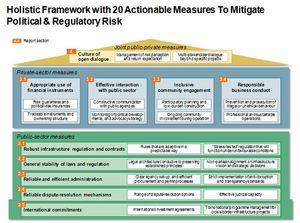NEW YORK, NY--(Marketwired - Feb 25, 2015) - To encourage sustainable economic growth worldwide, a huge investment will have to be made in infrastructure projects (an estimated 5 percent of global GDP during the next 15 years), and a significant share of this investment will have to come from the private sector. Private investors are understandably cautious, however. In particular, they are concerned about political and regulatory risk and unsure how to address this complex but increasingly troubling issue, according to a new World Economic Forum report, prepared in collaboration with The Boston Consulting Group (BCG).
The report, which is being released at the World Economic Forum's offices in New York City, analyzes the political risks that private-sector participants face when developing, owning, or operating infrastructure assets, and it provides a wide-ranging set of measures for reducing or at least managing those risks.
Political and regulatory risk is not simply a matter of outright expropriation, a widely publicized danger that is actually quite rare. It takes many other forms over an infrastructure project's life cycle. Early risks include delayed construction permits and community protests; risks during the operating phase include breach of contract and tightened regulations; and later risks include the nonrenewal of licenses and revised decommissioning requirements. In addition, some broader risks apply throughout the life cycle, such as changes to taxation laws and endemic corruption.
Titled Mitigation of Political & Regulatory Risk in Infrastructure Projects, the report surveys the full array of risks methodically and hones in on the best strategy for dealing with each of them. "While political and regulatory risk is often perceived as a developing-country issue, in fact it is nowadays increasingly relevant and prevalent in industrialized countries as well," warned Dr. Philipp Gerbert, a BCG senior partner and coauthor of the report. "For the vast majority of countries, private-sector investment in infrastructure is crucial, and this requires a properly conducive and stable political and regulatory environment."
The report's proposals are embodied in a risk mitigation framework comprising actionable measures to be taken by the various parties -- some by the private sector, some by the public sector, and some by the two sectors jointly. The framework, illustrated graphically below, enables policy makers and companies to take a holistic view of the potential levers. Further guidance is provided in the form of 25 international best practices from different infrastructure sectors -- such as roads, railroads, airports, and electricity supply -- where political and regulatory risk has been mitigated effectively.
On the private-sector side, investors and operators could seek political-risk insurance, for example, and companies could deter government intervention by carefully crafting ownership and commercial structures. On the public-sector side, national governments could provide protection to investors by offering constitutional guarantees, by ensuring fair and fast dispute-resolution mechanisms, and by enforcing robust anti-corruption policies.
The report was endorsed by John M. Beck, executive chairman of Aecon (Canada) and global co-chair of the Strategic Infrastructure Initiative. "Many of the solutions listed are of proven value," he said. "Consider the strategy adopted by some private companies of involving a public body as counterweight to the tendering government. In the Quito Airport case, for instance, the involvement of the Canadian government helped us to speedily resolve our differences with the Ecuadorian authorities. If the report succeeds in conveying all its innovative ideas to the right quarters, the great global infrastructure program will prove even more productive."
The report acknowledges that it will always be a challenge to get the balance right -- between investors' need for regulatory stability and government's freedom to adjust regulation in line with national priorities. But if both sides come to see that their interests are, at a deeper level, actually aligned, then they should be able to compromise and cooperate, to the benefit of all stakeholders.
A copy of the report can be downloaded via www.bcgperspectives.com.
To arrange an interview with one of the authors, please contact Eric Gregoire at +1 617 850 3783 or gregoire.eric@bcg.com.
About The Boston Consulting Group
The Boston Consulting Group (BCG) is a global management consulting firm and the world's leading advisor on business strategy. We partner with clients from the private, public, and not-for-profit sectors in all regions to identify their highest-value opportunities, address their most critical challenges, and transform their enterprises. Our customized approach combines deep insight into the dynamics of companies and markets with close collaboration at all levels of the client organization. This ensures that our clients achieve sustainable competitive advantage, build more capable organizations, and secure lasting results. Founded in 1963, BCG is a private company with 81 offices in 45 countries. For more information, please visit bcg.com.
About bcgperspectives.com
Bcgperspectives.com features the latest thinking from BCG experts as well as from CEOs, academics, and other leaders. It covers issues at the top of senior management's agenda. It also provides unprecedented access to BCG's extensive archive of thought leadership stretching back 50 years to the days of Bruce Henderson, the firm's founder and one of the architects of modern management consulting. All of our content -- including videos, podcasts, commentaries, and reports -- can be accessed by PC, mobile, iPad, Facebook, Twitter and LinkedIn.
Contact Information:
The Boston Consulting Group
Eric Gregoire
Global Media Relations Manager
Tel +1 617 850 3783
Fax +1 617 850 3701
gregoire.eric@bcg.com
